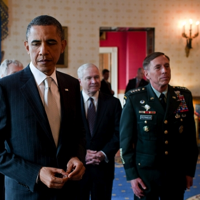President Barack Obama reshuffled his national security team last week, and the reviews were overwhelmingly positive. The White House proclaimed that this was the "strongest possible team," leaving unanswered the question, "Toward what end?" Obama's choices represent the continued reduction of the role of security as an administration priority. That fits into his determined strategy to reduce America's overseas military commitments amid the country's ongoing fiscal distress. Obama foresees a smaller, increasingly background role for U.S. security in the world, and these selections feed that pattern.
First, there is Leon Panetta's move from director of the Central Intelligence Agency to secretary of defense. When you're looking for $400 billion in future military cuts, Panetta's credentials apply nicely: former White House chief of staff and director of the Office of Management and Budget under President Bill Clinton, and 9-term congressman from defense-heavy California. But, truth be told, Panetta wasn't the president's first choice -- or his second, third, fourth or fifth.
According to my Pentagon sources, the job was initially offered to Hillary Clinton, who would have been a compelling candidate for the real task at hand: working to get more help from our European allies for today's potpourri of security hotspots, while reaching out to the logical partners of tomorrow -- like rising China, India, Turkey, South Africa and Brazil, among others. She would have brought an international star power and bevy of personal connections to those delicate efforts that Panetta will never muster. But Clinton has had enough of nonstop globe-hopping and will be gone at the end of Obama's first term.

